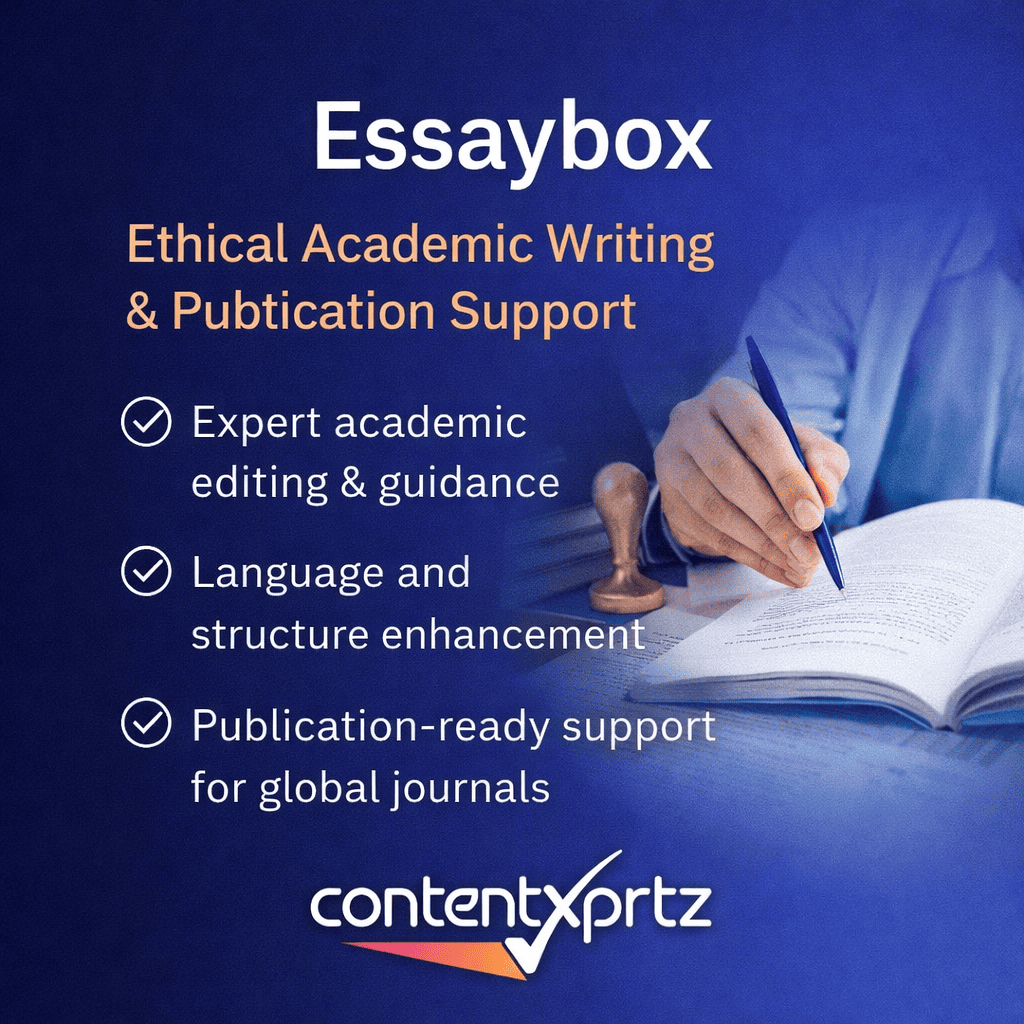Blog Content Writer as an Academic Ally: How Expert Writing Support Transforms PhD Research and Publication Outcomes
Introduction
For many doctoral candidates and academic researchers, the journey from an initial research idea to a successfully published manuscript is intellectually rewarding but also emotionally and professionally demanding. At the heart of this journey lies writing. Not simply writing as a mechanical skill, but academic writing as a disciplined, structured, and highly scrutinized scholarly practice. In this context, the role of a Blog Content Writer has evolved far beyond marketing or general web communication. Today, an academically trained Blog Content Writer functions as a strategic academic ally who understands research logic, publication standards, and disciplinary expectations.
Within the first year of doctoral enrollment, many PhD scholars realize that subject expertise alone is insufficient. Clear articulation, methodological precision, and journal-aligned structuring determine whether a manuscript advances or stalls. This reality explains why increasing numbers of researchers actively seek professional academic writing and editing support. According to UNESCO Institute for Statistics, global research output has more than doubled over the past two decades, intensifying competition for limited journal space. Acceptance rates in top-tier journals indexed in Scopus or Web of Science frequently fall below 10 percent, particularly in management, engineering, and health sciences.
At the same time, PhD scholars face mounting pressures. These include strict timelines, teaching responsibilities, funding constraints, publication mandates, and rising article processing charges. For international scholars, linguistic and stylistic barriers add another layer of complexity. Consequently, the demand for ethical, expert-led academic writing support has grown steadily across regions such as Asia, Europe, Australia, and North America.
In this landscape, a Blog Content Writer trained in academic conventions plays a crucial role. Unlike generic writers, such professionals translate complex research ideas into coherent, publication-ready narratives while preserving authorial voice and academic integrity. They understand journal scopes, reviewer expectations, citation protocols, and evolving editorial policies. More importantly, they work as collaborators, not ghostwriters, ensuring that scholars remain the intellectual owners of their work.
At ContentXprtz, this philosophy has guided our work since 2010. Serving researchers in more than 110 countries, our academic writing specialists combine disciplinary expertise with editorial precision. Whether supporting doctoral dissertations, systematic literature reviews, or high-impact journal submissions, we recognize that writing is not a peripheral task but the backbone of scholarly success.
This educational article explores the expanding academic role of a Blog Content Writer, explains how professional writing support enhances PhD outcomes, and clarifies how scholars can ethically and effectively collaborate with expert academic writers. The discussion integrates evidence from leading academic publishers, practical guidance for doctoral researchers, and insights drawn from global publication practices. For PhD scholars navigating the complex terrain of academic writing and publishing, this guide offers clarity, reassurance, and strategic direction.
Understanding the Academic Role of a Blog Content Writer
From Digital Writing to Scholarly Communication
Traditionally, the term Blog Content Writer referred to professionals producing online articles for general audiences. However, within academic ecosystems, the role has expanded significantly. An academic-focused Blog Content Writer operates at the intersection of scholarly communication, editorial science, and research dissemination. Their work is grounded in academic rigor, methodological awareness, and ethical compliance.
Such writers are familiar with discipline-specific discourse styles, argumentation structures, and citation frameworks. They understand the difference between narrative reviews and systematic reviews, between conceptual papers and empirical studies, and between practitioner-oriented and theory-driven journals. This depth of understanding differentiates academic writing specialists from commercial content writers.
Core Competencies of an Academic Blog Content Writer
An academically trained Blog Content Writer brings a distinct set of competencies that directly support PhD scholars and researchers.
These competencies include advanced academic English proficiency, familiarity with publication ethics, and the ability to align manuscripts with journal guidelines. They also include experience with reviewer feedback interpretation, coherence enhancement, and structural optimization. At ContentXprtz, our writers undergo rigorous internal training to ensure alignment with international editorial standards.
Equally important is the ability to maintain the scholar’s intellectual voice. Ethical academic writing support does not involve content fabrication or data manipulation. Instead, it focuses on clarity, logical flow, and scholarly presentation.
Why PhD Scholars Increasingly Seek Professional Writing Support
Time Constraints and Cognitive Load
Doctoral research is cognitively intensive. Designing studies, collecting data, running analyses, and engaging with theoretical frameworks require sustained intellectual effort. Writing, although integral, often competes with these demands. Professional writing support helps scholars manage this cognitive load more effectively.
By collaborating with an expert Blog Content Writer, PhD candidates can allocate their time strategically. This collaboration allows them to focus on conceptual depth while ensuring that their writing meets academic expectations.
Language and Structural Challenges
For non-native English speakers, academic writing presents additional challenges. Even highly capable researchers may struggle with tone, coherence, or discipline-specific phrasing. Leading publishers such as Elsevier consistently emphasize clarity and linguistic accuracy as key acceptance criteria.
Professional academic writing and editing services bridge this gap by refining language without altering meaning. This process enhances readability and reduces the likelihood of desk rejection due to presentation issues.
Publication Pressure and Career Advancement
In many academic systems, timely publication determines funding continuation, graduation eligibility, and career progression. Universities increasingly require doctoral candidates to publish in indexed journals prior to thesis submission. This pressure underscores the importance of expert writing support that aligns manuscripts with journal expectations.
Academic Writing, Editing, and Ethical Boundaries
What Ethical Academic Writing Support Means
Ethical academic writing support operates within clearly defined boundaries. It does not involve ghostwriting, data fabrication, or authorship misrepresentation. Instead, it focuses on editing, restructuring, and enhancing clarity based on author-provided content.
Organizations such as the American Psychological Association emphasize transparency and author responsibility in scholarly publishing. ContentXprtz adheres strictly to these principles, ensuring that all writing support enhances, rather than replaces, scholarly contribution.
Distinguishing Editing from Authorship
Professional academic editors and writers do not claim authorship. Their role is advisory and supportive. They may suggest improvements, highlight gaps, and recommend structural changes. However, final intellectual decisions remain with the researcher.
This distinction is essential for maintaining academic credibility and avoiding ethical breaches.
The Role of a Blog Content Writer in PhD Thesis Development
Structural Coherence Across Chapters
A doctoral thesis is a complex, multi-chapter document that must demonstrate coherence across sections. Many PhD scholars struggle to maintain consistency in tone, argumentation, and terminology. An experienced Blog Content Writer helps align chapters logically while respecting disciplinary conventions.
For example, ensuring that research questions introduced in the first chapter are consistently addressed in methodology, results, and discussion chapters strengthens the overall thesis narrative.
Literature Review Synthesis
Literature reviews require critical synthesis rather than descriptive summaries. Academic writing specialists assist scholars in organizing literature thematically, identifying gaps, and integrating theoretical perspectives. Publishers such as Springer emphasize analytical depth and synthesis as hallmarks of high-quality doctoral work.
Research Paper Writing and Journal Publication Support
Journal Selection and Scope Alignment
Selecting an appropriate journal is a strategic decision. Academic Blog Content Writers with publication experience understand journal scopes, impact metrics, and editorial preferences. They guide researchers toward journals that align with their study design and contribution.
This guidance reduces desk rejection risk and improves submission efficiency.
Reviewer Comment Interpretation
Responding to reviewer feedback is one of the most challenging stages of academic publishing. Expert writing support helps scholars interpret reviewer comments constructively and respond with clarity and professionalism. This process often determines whether a manuscript progresses toward acceptance.
Integrated Academic Support at ContentXprtz
ContentXprtz offers comprehensive support across the academic lifecycle. Our PhD thesis help services assist doctoral candidates from proposal development to final submission. Through our academic editing services, we ensure linguistic precision and structural coherence.
For early-stage researchers, our research paper writing support provides foundational guidance. We also support senior scholars and professionals through book authors writing services and corporate writing services.
Frequently Asked Questions Integrated for Academic Clarity
FAQ 1: Is hiring a Blog Content Writer for PhD work ethically acceptable?
Ethical acceptability depends on the nature of support. Professional academic writing services focus on editing, structuring, and clarity enhancement rather than content creation. Leading publishers such as Taylor & Francis recognize language editing as acceptable when authors retain intellectual ownership.
FAQ 2: How does academic editing differ from proofreading?
Academic editing addresses structure, argument flow, and scholarly tone. Proofreading focuses on grammar and formatting. Both are essential, but editing offers deeper academic value.
FAQ 3: Can professional writing support improve journal acceptance rates?
While no service guarantees acceptance, studies referenced by Emerald Insight highlight clarity and structure as key factors influencing reviewer decisions.
FAQ 4: Do journals penalize authors for using editing services?
Reputable journals do not penalize authors for ethical editing support. Transparency and adherence to guidelines are critical.
FAQ 5: How early should PhD scholars seek writing support?
Early engagement during proposal or literature review stages often yields better outcomes by preventing structural issues later.
FAQ 6: Is writing support useful for native English speakers?
Yes. Academic writing requires specialized conventions that differ from everyday English. Even native speakers benefit from expert editing.
FAQ 7: How does ContentXprtz ensure confidentiality?
ContentXprtz follows strict confidentiality protocols, data protection measures, and non-disclosure agreements.
FAQ 8: Can writing support help with systematic reviews?
Yes. Academic Blog Content Writers assist with PRISMA-aligned structuring and synthesis clarity.
FAQ 9: What qualifications should an academic writer have?
Ideal qualifications include advanced degrees, publication experience, and familiarity with editorial standards.
FAQ 10: How does professional support reduce PhD stress?
By providing structured guidance, writing support reduces uncertainty, improves confidence, and supports timely completion.
Conclusion and Call to Action
Academic success depends not only on research quality but also on effective scholarly communication. In an increasingly competitive global research environment, the role of a Blog Content Writer has evolved into that of a strategic academic partner. For PhD scholars and researchers, ethical and expert writing support enhances clarity, strengthens arguments, and aligns work with international publication standards.
ContentXprtz stands at the forefront of this support ecosystem. With over a decade of experience and a global footprint, we combine academic rigor with empathetic guidance. Our services are designed to empower scholars, not replace them, ensuring that every manuscript reflects authentic intellectual contribution.
We invite you to explore our PhD Assistance Services and discover how expert academic support can elevate your research journey.
At ContentXprtz, we don’t just edit — we help your ideas reach their fullest potential.

